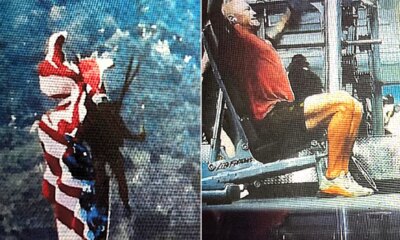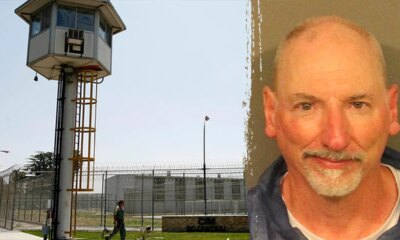California
A constitutionally dubious California bill would ban possession of AI-generated child pornography

Back in 2016, a study found that it was increasingly difficult for subjects to distinguish between actual photographs of people and computer-generated simulations of them. The researchers suggested that development would complicate prosecution of child pornography cases. That concern has been magnified by rapid improvements in artificial intelligence, prompting a California bill that would, among other things, make it a felony to possess virtual child pornography when it qualifies as “obscene.” This provision seems constitutionally problematic in light of the U.S. Supreme Court’s holding that the First Amendment bars legislators from criminalizing the mere possession of obscene material.
Assembly Bill 1831, introduced by Assemblymember Marc Berman (D–Palo Alto) on January 12, aims to expand the state’s definition of child pornography to include “representations of real or fictitious persons generated through use of artificially intelligent software or computer-generated means, who are, or who a reasonable person would regard as being, real persons under 18 years of age, engaging in or simulating sexual conduct.” Since that new definition would pose obvious First Amendment problems as applied to constitutionally protected images, the bill specifies that such representations must meet the state’s definition of obscenity: material that “to the average person, applying contemporary statewide standards, appeals to the prurient interest”; “depicts or describes sexual conduct in a patently offensive way”; and “taken as a whole, lacks serious literary, artistic, political, or scientific value.”
That definition of obscenity tracks the test that the Supreme Court established in the 1973 case Miller v. California. But four years earlier in Stanley v. Georgia, the Court unanimously rejected a state law that made it a crime to possess “obscene matter.” Writing for the Court, Justice Thurgood Marshall drew a distinction between that ban and other obscenity laws: “Whatever may be the justifications for other statutes regulating obscenity, we do not think they reach into the privacy of one’s own home. If the First Amendment means anything, it means that a State has no business telling a man, sitting alone in his own house, what books he may read or what films he may watch. Our whole constitutional heritage rebels at the thought of giving government the power to control men’s minds.”
Berman evidently did not view the Supreme Court’s reading of the First Amendment as an obstacle to his goals, and he is by no means alone in that. Way back in 1996, Congress tried to ban “any visual depiction, including any photograph, film, video, picture, or computer or computer-generated image or picture,” that “is, or appears to be, of a minor engaging in sexually explicit conduct.” The Supreme Court deemed that law unconstitutional in the 2002 case Ashcroft v. Free Speech Coalition, noting that “the literal terms of the statute embrace a Renaissance painting depicting a scene from classical mythology” as well as “Hollywood movies, filmed without any child actors, if a jury believes an actor ‘appears to be’ a minor engaging in ‘actual or simulated…sexual intercourse.’”
Congress tried again in 2003. The PROTECT Act covered any “digital image, computer
image, or computer-generated image” that is “indistinguishable” from “that of a minor engaging in sexually explicit conduct.” Unlike Berman’s bill, it did not require that such material qualify as obscene, making it even more constitutionally questionable. But it did include an obscenity test for another category of proscribed material: “a visual depiction of any kind, including a drawing, cartoon, sculpture, or painting,” that “depicts a minor engaging in sexually explicit conduct.” And the law applied a less demanding test to any visual depiction of “a minor engaging in graphic bestiality, sadistic or masochistic abuse, or sexual intercourse, including genital-genital, oral-genital, anal-genital, or oral-anal.” The PROTECT Act made such material illegal if it “lacks serious literary, artistic, political, or scientific value,” dispensing with the other two prongs of the obscenity test.
In 2008, the U.S. Court of Appeals for the 4th Circuit considered the case of a Virginia man, Dwight Whorley, who was charged with violating the PROTECT Act by “knowingly receiving on a computer 20 obscene Japanese anime cartoons depicting minors engaging in sexually explicit conduct.” Whorley argued that the law’s prohibition on receiving obscene images was “facially unconstitutional” because “receiving materials is an incident of their possession, and possession of obscene materials is protected by the holding of Stanley v. Georgia.”
The 4th Circuit rejected that claim. “Stanley‘s holding was a narrow one, focusing only on the possession of obscene materials in the privacy of one’s home,” the majority said. “The Court’s holding did not prohibit the government from regulating the channels of commerce.” The appeals court perceived the provision under which Whorley was charged as “focusing on the movement of obscene material in channels of commerce, and not on its mere possession.” So even though receiving, viewing, and possessing images are all essentially the same thing in the context of the internet, the appeals court concluded that Whorley’s prosecution did not run afoul of Stanley. But even that debatable reading does not seem to help Berman’s bill, which explicitly applies to “every person who knowingly possesses or controls” the newly prohibited images.
Whorley also argued that the PROTECT Act was “unconstitutional under the First Amendment, as applied to cartoons, because cartoons do not depict actual minors.” The 4th Circuit also rejected that argument, noting that cartoons are covered by the law only when they are “obscene” and that obscenity is not protected by the First Amendment.
That point does aid the defense of Berman’s bill, but again not insofar as it applies to mere possession. In other cases involving cartoons, such as manga, Simpsons porn, and “incest comics,” federal defendants have pleaded guilty to possession charges, avoiding a constitutional test.
As applied to distribution, A.B. 1831’s obscenity requirement follows the approach that New York University law professor Rosalind Bell recommended in a 2012 law review article. Bell argued that the PROTECT Act provision covering digital images “indistinguishable” from the real thing, which does not require a finding of obscenity, is clearly unconstitutional.
In the 1982 case New York v. Ferber, Bell noted, “the Court established that the First Amendment does not extend to child pornography because the state has a special interest in protecting children from harm.” That interest, the Court held eight years later in Osborne v. Ohio, justifies even a ban on private possession of child pornography. But those cases involved actual child pornography, and the Court’s reasoning focused on the injury that its production and dissemination inflicts on the children whose abuse it documents.
“Post-Ferber child pornography regulation and court decisions interpreting this regulation have become untethered from the Supreme Court’s crucial limiting interest in protecting children from physical and emotional harm,” Bell wrote. “Increasingly, congressional action and court opinions reflect concerns about controlling private thoughts rather than preventing and punishing direct harm.”
Bell noted that Adrian Lyne’s 1997 film adaptation of “Vladimir Nabokov’s famous novel Lolita” went “straight to cable” because distributors worried that law enforcement agencies might deem it child pornography. “Writers and artists have explored the theme of adolescent sexuality in countless valuable works,” she wrote. “By banning non-obscene virtual depictions of child sexuality without reference to their social value, we exceed the First Amendment’s crucial dictates and jeopardize these works, including acclaimed films like Romeo and Juliet, The Tin Drum, American Beauty, and Taxi Driver.”
The “serious value” of such material presumably would protect it from Berman’s bill, which is why the obscenity requirement is crucial. But the ban on possession still flies in the face of the Supreme Court’s conclusion that “a State has no business telling a man” what he can look at while “sitting alone in his own house.” Although the Court later made an exception for pornography involving actual children, that exception does not encompass images that can be produced without violating anyone’s rights.

California
Supreme Court blocks California law limiting schools from telling parents about trans students

BAKERSFIELD, Calif.(KBAK/KBFX) — The U.S. Supreme Court has temporarily blocked a California law that limited when schools could require staff to disclose a student’s gender identity, clearing the way for schools to tell parents if their children identify as transgender without getting the students’ approval.
Rear view of multiracial students with hands raised in classroom at high school
The decision came after religious parents and educators, represented by the Thomas More Society, challenged California school policies aimed at preventing staff from disclosing a student’s gender identity.
Erwin Chemerinsky, dean and professor of law at the University of California Berkeley School of Law, said the ruling favors parents’ ability to be informed. “The Supreme Court today rules in favor of the claim of parents to be able to know the gender identity and gender pronoun of the children,” Chemerinsky said.
FILE:{ }transgender flag against blue sky background { }(Photo: AdobeStock)
The decision temporarily blocks a state law that bans automatic parental notification requirements if students change their pronouns or gender expression at school. The Thomas More Society called the decision a major victory for parents, saying the court found California’s policy likely violates constitutional rights.
Chemerinsky said the Supreme Court’s action is an emergency ruling. “This law is now put on hold. So what this means is that schools can require that teachers and other staff inform parents of the gender identity or gender pronouns of children,” he said.
Kathie Moehlig, founder and executive director of Trans Family Support Services, said she is concerned about how the ruling could affect students who do not have supportive families.
“I am really concerned about our kids that do come from these non affirming homes, that they know that they’re going to get in trouble, that they’re going to possibly have violence brought against them possibly kicked out of their homes,” Moehlig said.
Moehlig said parents should eventually know, but that the conversation should happen when a student feels safe. “Our students are going to be less inclined to confide in any adults that might be able to help to get them access to mental healthcare, to a support system. They may still tell their peers but they’re certainly not going to tell any other adult,” she said.
Equality California, a LGBTQ+ civil rights organization, shared a statement:
Equality California, the nation’s largest statewide LGBTQ+ civil rights organization, released the following statement from Executive Director Tony Hoang in response to today’s U.S. Supreme Court shadow docket ruling in Mirabelli v. Bonta regarding California’s student privacy protections for transgender youth. Today’s decision by the U.S. Supreme Court to intervene in this case is deeply disturbing. By stepping in on an emergency basis, the Court has effectively upended California’s student privacy protections without hearing full arguments and before the judicial process has run its course. While not surprising, this move reflects a dangerous willingness to short-circuit the established judicial process to dismantle protections for transgender youth. While this case continues to be litigated, the ruling revives Judge Benitez’s prior decision, which broadly targets numerous California laws protecting transgender and gender-nonconforming students — threatening critical safeguards that prevent forced outing and allow educators to respect a student’s affirmed name and pronouns at school. These protections exist for one reason: to keep students safe and ensure schools remain places where young people can learn and thrive without fear. To be clear: today’s decision does not impact California’s SAFETY Act, which prohibits school districts from adopting policies that forcibly out transgender students. The SAFETY Act remains in full effect, and we will continue defending it. Transgender youth deserve dignity, safety, and the freedom to learn without fear. We will never stop fighting for transgender youth and their families. Equality California will continue working with parents, educators, and advocates to ensure schools remain safe, welcoming, and focused on the success and well-being of every student.
The case now returns to the U.S. Court of Appeals for the Ninth Circuit, which will decide whether the California law is constitutional.
California
Rep. Kevin Kiley announces run in California’s redrawn 6th Congressional District

Congressman Kevin Kiley has announced his plan to run in California’s newly redrawn 6th district.
In a statement on Monday, Rep. Kiley revealed he had considered running in the 5th District – which could have set up a possible showdown between two current Republican officeholders.
“It’s true that I was fully prepared to run in the new 5th, having tested the waters and with polls showing a favorable outlook in a “safe” district. But doing what’s easy and what’s right are often not the same,” Kiley stated.
Kiley currently represents California’s 3rd district, which originally comprised counties making up much of the back spine of the state.
As of the Prop. 50 redistricting push, the 3rd district was redrawn for the 2026 midterm election to lean toward the Democratic Party – with those eastern spine of California counties lopped off and more of Sacramento County, including Rancho Cordova, added.
California’s new 6th district is now comprised of Rocklin, Roseville, Citrus Heights, much of North and East Sacramento, and the city of West Sacramento. Democratic Rep. Ami Bera currently represents the district, but will be running for the new 3rd district in 2026.
Other declared candidates for the 6th district include Democrats Lauren Babb Thomlinson, Thien Ho, Richard Pan, Kindra Pring, Tyler Vandenberg, and Republicans Christine Bish, Craig DeLuz, and Raymond Riehle.
Kiley was first elected to the House in 2022 and was reelected in 2024.
California
Preliminary magnitude 3.3 earthquake strikes near San Ramon, USGS says

SAN RAMON, Calif. (KGO) — An earthquake with a preliminary magnitude of 3.4 struck near San Ramon at 11:21 p.m. Sunday, the U.S. Geological Survey said.
USGS said the tremor was about 8.4 km in depth.
According to the Geological Survey, people typically report feeling earthquakes larger than about magnitude 2.5.
The closer to the surface an earthquake occurs, the more ground shaking and potential damage it will cause.
No injuries have been reported.
This is the latest quake in San Ramon, which has seen multiple strings of tremors in the past several months.
Bay City News contributed to this report.
MAP: Significant San Francisco Bay Area fault lines and strong earthquakes
Zoom in on the map below and compare where you live to the significant faults and where strong earthquakes have struck in the Bay Area.
Stay with ABC7 News for the latest details on this developing story.
RELATED STORIES & VIDEOS:
Copyright © 2026 KGO-TV. All Rights Reserved.
-

 World6 days ago
World6 days agoExclusive: DeepSeek withholds latest AI model from US chipmakers including Nvidia, sources say
-

 Massachusetts6 days ago
Massachusetts6 days agoMother and daughter injured in Taunton house explosion
-

 Denver, CO6 days ago
Denver, CO6 days ago10 acres charred, 5 injured in Thornton grass fire, evacuation orders lifted
-

 Louisiana1 week ago
Louisiana1 week agoWildfire near Gum Swamp Road in Livingston Parish now under control; more than 200 acres burned
-

 Oregon4 days ago
Oregon4 days ago2026 OSAA Oregon Wrestling State Championship Results And Brackets – FloWrestling
-

 Florida2 days ago
Florida2 days agoFlorida man rescued after being stuck in shoulder-deep mud for days
-

 Technology1 week ago
Technology1 week agoArturia’s FX Collection 6 adds two new effects and a $99 intro version
-

 News1 week ago
News1 week agoVideo: How Lunar New Year Traditions Take Root Across America























